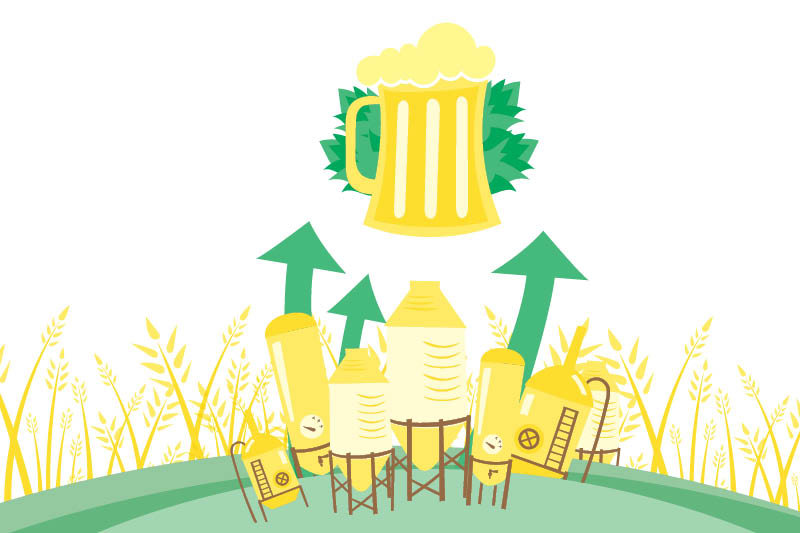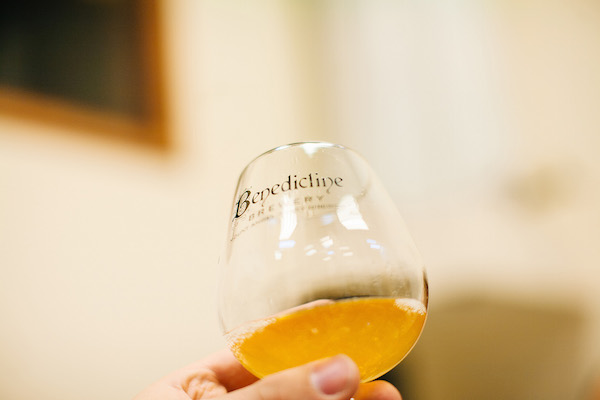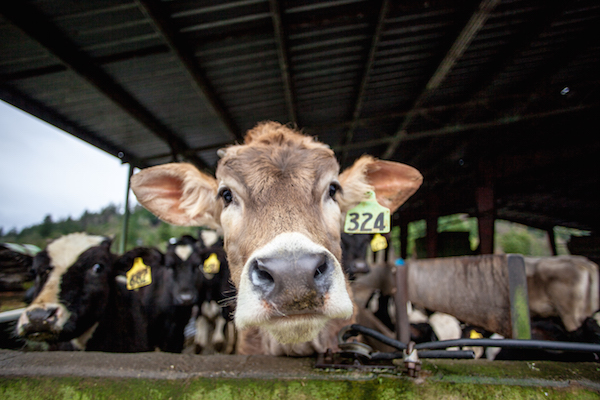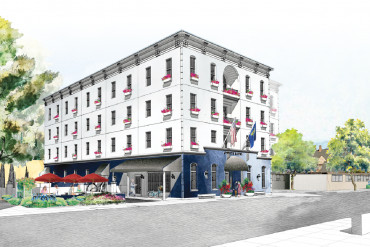written by Lucy Burningham
Headquartered in Belgium, Anheuser-Busch InBev is the world’s largest brewing company, thanks to well-known brands including Budweiser and Corona. The company has annual revenues of more than $43 billion, sells 200 brands of beer, brews more than 500 million barrels of beer and operates in twenty-four countries. Hop farmers in Oregon once were part of the massive conglomerate’s supply chain.
Today, however, Budweiser’s “share of throat” in Oregon is a fraction of what it could be. Craft breweries are taking over. Once considered a quirky startup culture, the state’s craft brewing industry now produces $2.83 billion in total economic impact.
Oregon brewers source hops from local farms, create labs for making brewers’ yeast, build production facilities, hire more brewers, design and construct breweries, hire servers, and finally, open restaurants that serve meat and vegetables from local farms. The dozens of craft beer-related micro-economies add up, especially in Oregon, where 213 brewing facilities in seventy cities—the most breweries per capita of any state in the U.S.— employ 29,000 people.
Oregon isn’t the only place where craft brewing matters. The national craft brewing industry has a remarkably different effect on local economies than the mega brewers do, said Bart Watson, chief economist of the Brewers Association, an advocacy group based in Boulder, Colorado. “They incorporate coffee from local roasters into a coffee stout,” he said. “They’re part of local festivals. They use the local T-shirt maker.”
While beer lovers usually buy beer primarily for quality and flavor, Watson said, local products and communities also influence craft beer drinkers’ decisions. It’s an important distinction in Oregon, where the Oregon Brewers Guild estimates that 47 percent of all draft beer consumed in Oregon is made within the state’s borders.
Ninkasi Brewing of Eugene has grown into a small empire of its own. In 2006, the nascent brewery consisted of just two people—founders Jamie Floyd and Nikos Ridge. The following year, the duo added three people to the payroll. Today, Ninkasi has ninety-six employees.
Last year, the brewery made and sold 86,507 barrels of beer, but that amount could seem quaint in another couple of years. Ninkasi built an office and a new brewery adjacent to the original brew site. The additional 55,000 square feet of space gives the brewery the capacity to brew 275,000 barrels of beer in a single year, said Ridge, Ninkasi CEO.
“We grew faster than we anticipated when we started,” he observed. “But we’ve been responsive to the growth that was happening, and finally we have a little bit of headroom.”
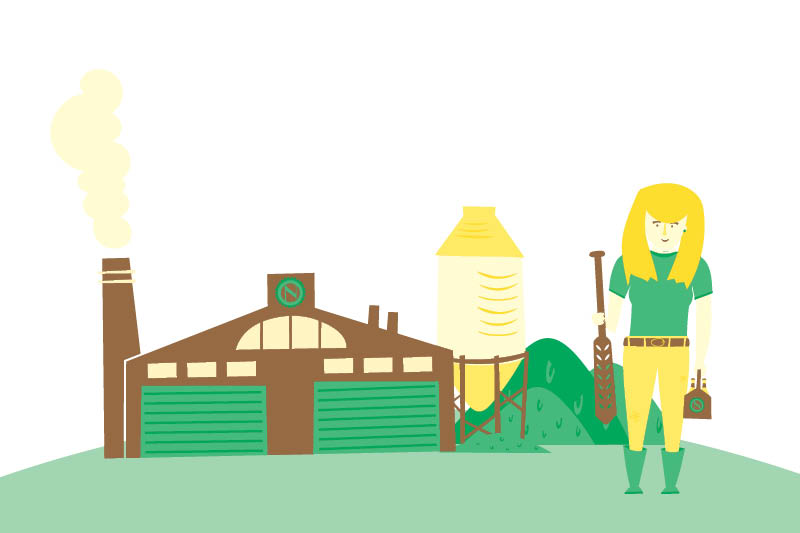
The two new buildings, currently under review to become LEED certified, were designed and constructed using mostly local sources, from architects and contractors to engineers and construction workers.
All that work was powered by beer, or at least the consumer demand for more brew. Many of those beers require sizeable quantities of hops. In 2013, Ninkasi bought 193,386 pounds of hops at an average price of $8.40 per pound from four Washington-based brokers. Two of the brokers—Hopunion and Brewers Supply Group—supply the brewery with regional hops, while specialty imported hops come from SS Steiner and Barth-Hass Group.
Ninkasi brews with malted barley from Washington, Idaho and Canada, but not Oregon as not enough acres here are planted with barley. It’s a disappointment for Oregon brewers who want to buy as many local ingredients as possible. In 2011, Oregon farmers harvested just 2.4 million bushels of barley, according to a report from the Oregon State University Extension Service, the lowest amount since 1909. At OSU, a barley breeding program is under way to create new breeds of barley that will thrive in Oregon’s climate. In the meantime, brewers find their barley elsewhere.
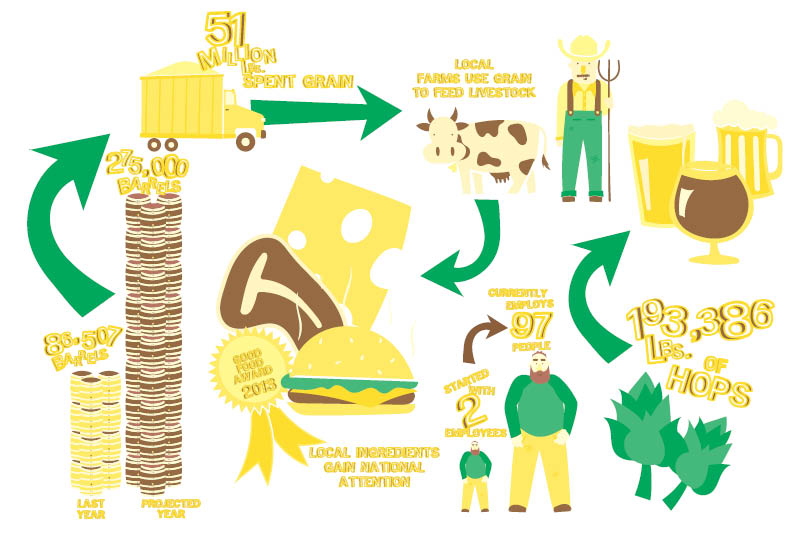
Since 2009, Ninkasi has “upcycled” an estimated 51 million pounds of spent grain to Oregon Natural Meats, a local family-owned meat company that feeds its cattle 11 million pounds of spent grains each year.
Ninkasi’s yeast is propagated in-house by lab technician Dana Garves, who also runs quality control on all beers. “I like to brag that each and every beer you drink has been through my lab on average thirty-two times, from its youngest moments as malt, water and yeast to its final form in a bottle or keg,” she said.
Ninkasi strives to be connected to local communities by being sustainable. In 2014, the brewery received a Good Food Awards medal, an accolade that accounts for the brewery’s sustainability efforts, including its use of solar panels and water conservation.
Those efforts extend to materials sourcing. Ninkasi’s glass bottles are produced by Saxco International and Owens-Illinois in Portland, using as much as 60 percent post-consumer glass that largely originates in Portland. Bottled beers are affixed with labels produced by Shelton-Turnbull, a printer located less than three miles from the brewery. Graphic Packaging Inc. in Portland creates the cardboard carriers and cartons, which are sourced sustainably.
Being connected to so many local industries is a de facto element of craft brewing, commented Ridge. “Literally thousands of people know that we’re their business partners.”
When Block 15 Brewery opened IN 2008 in Corvallis, it had forty employees and brewed 800 barrels of beer. Today, the brewery and pub employs eighty-four people. Last year, the brewery made 1,200 barrels of beer. Since inception, Block 15 has developed a reputation for locally sourcing everything from hops to farmers’ market fruit, ingredients that have become part of the brewery’s highly regarded barrel-aging program.
Brewer and owner Nick Arzner said that Block 15 ages many of its beers in barrels, 160 barrels to be exact. While most of the barrels once held Oregon pinot noir from wineries including Anne Amie, 3 Fools, and Left Coast Vineyards, some are sourced from distillers who have aged bourbon, rum, cognac and brandy in the barrels. Each used barrel costs between $50 and $100, although it’s not always a cash transaction. Sometimes beer is the trade currency, Arzner said.
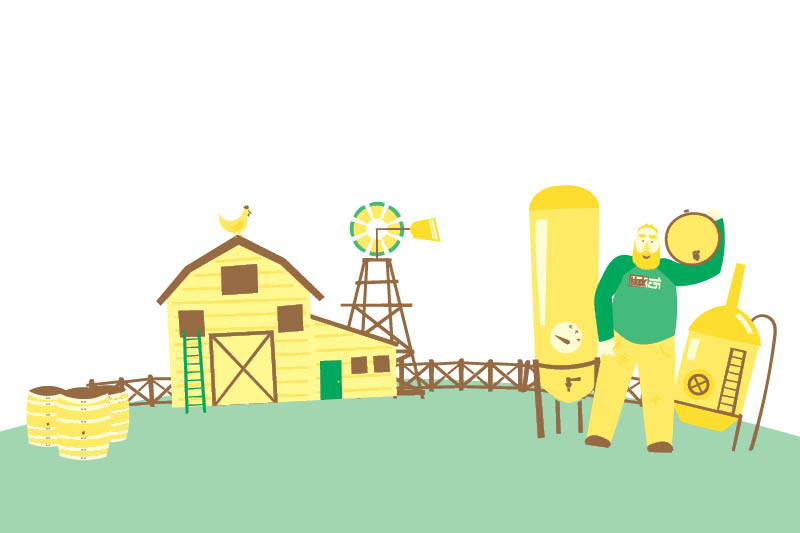
To make its fruit beers last year alone, Block 15 bought 4,000 pounds of fruit from local farmers, including some who sell produce down the street at the Corvallis farmers’ market. Tart cherries come from The Cherry Country near Salem, raspberries from Denison Farms in Corvallis, peaches from Olson Family Farms in Salem, strawberries from Stahlbush Island Farms in Covallis and grapes from Left Coast Cellars in Rickreall. For some seasonal beers, including the Honey Wit and Ferme de La Ville Provision, the brewery buys honey from Queen Bee Apiaries in Corvallis.
Almost every Block 15 beer includes hops. In 2013, the brewery bought a total of 2,000 pounds of hops, the equivalent of about an acre of plants. The hops came from five brokers and farms, and while most of the hops were grown in Washington’s Yakima Valley, the largest hop-producing region in the country, some were grown in Europe and Australia.
Block 15 bought some of its hops directly from Crosby Hop Farm, a fifth-generation hop grower near Woodburn. Blake Crosby, from the youngest generation of hop farmers, said keeping up with the increasing demand for quantity and variety from craft brewers is one of the farm’s greatest challenges. “We’re anxiously and dearly expanding where we can by adding more acreage every year,” he said. “We see that happening for quite a few years to come.”
To remain competitive, Crosby Hop Farm processes all its hops on site, pelletizing them for shipment to brewers. It also operates a hops brokerage service, to provide a direct route to Oregon brewers who would otherwise buy Oregon hops that are shipped to a broker in Yakima, then sent back to Oregon. Why send the hops on a 540-mile roundtrip when the brewery is just down the road? “That doesn’t really make sense,” said Crosby.
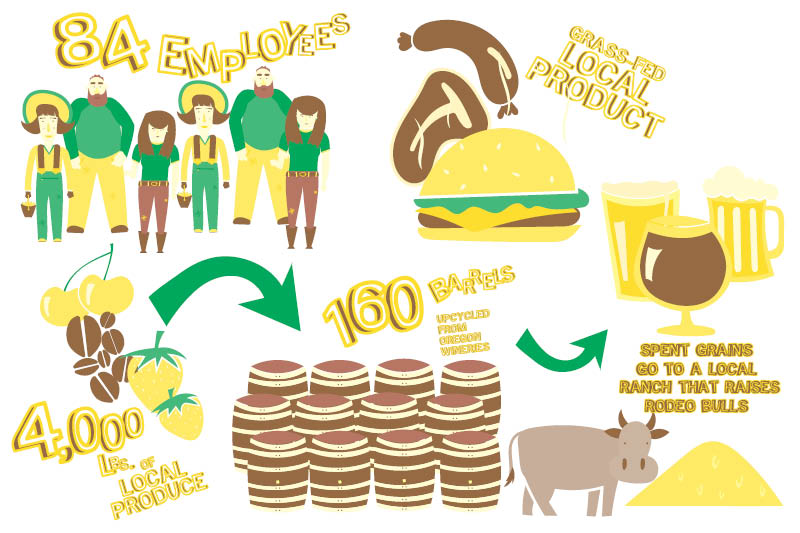
Block 15 buys most of its yeast from Wyeast Laboratories in Hood River. Arzner noted that the brewery also takes advantage of a free commodity—naturally occurring airborne yeasts and bacteria that contribute to the fermentation of beers. On the food side of operations, Block 15’s brewpub incorporates local ingredients into many menu items, from the Painted Hills Natural Beef burgers out of Wheeler County to Dungeness crab cakes made from crabs caught off the Oregon coast to Olympic Provisions cured meats from Portland and Tillamook cheese from the Oregon coastal town of the same name. Instead of sending spent grains to beef cattle, the brewery’s spent grains are trucked to a farmer who raises rodeo bulls. “Our grains go to help buck cowboys,” Arzner said.
It’s In the Wood
As an increasing number of brewers barrel-age beer, which adds a depth of flavor to the final brew, many are scrambling to find enough barrels—the right barrels. The most coveted ones were previously used to age spirits or make wine, because the characteristics of those liquids remain in the wood and end up in the beer that spends time in contact with the wood. Two Oregon breweries have barrel programs that eliminate the need to source barrels elsewhere.
Since McMenamins distills spirits and brews beer, barrels from the Edgefield Distillery go directly to one of the twenty-four McMenamins breweries in Oregon and Washington. In 2013, the distillery gave the company’s brewers fifty freshly emptied barrels. Some barrels held cellar-conditioned whiskeys, including Hogshead, Devils Bit and Monkey Puzzle. Other barrels once housed rum, and before that, whiskey, which made the beer the third liquid to benefit from the wood’s character.

After a brewery is finished with the barrels, the barrels are re-purposed as landscape art, planters and trash receptacles for McMenamins properties.
Head distiller Clark McCool says the brewery saved between $3,700 and $7,000 last year by not having to buy new or used barrels for aging beer. More importantly, having barrels in house means not having to worry about sourcing. “With the explosion of the craft whiskey scene and barrel-aged beers in America, purchasing opportunities on the used barrel market remain extremely tight,” he observed.
Rogue Ales & Spirits also distills spirits and brews beer, but because of the popularity of the distilling program, distillers re-use most of the barrels instead of passing them along to the brewery, said Michael Higgins, the company’s president. In the past, some Rogue beers were aged in Rogue Spirits barrels, including John-John Dead Guy Ale, which was Dead Guy Ale aged in Dead Guy Whiskey barrels.
That’s not to say Rogue isn’t aging beer in barrels. In 2010, the brewery commissioned Rick DeFerrari at McMinnville’s Oregon Barrel Works, a cooperage that handcrafts oak wine barrels, to build two 1,500-gallon barrels—known internally as “big ass barrels”—for aging beer. Brewmaster John Maier makes six to eight batches a year, producing 1,200 to 1,600 kegs of barrel-aged beer.
Oregon Barrel Works, was founded in 2000 to supply the burgeoning wine industry in Oregon. DeFerrari, who grew up next to Ponzi Vineyards and earned a degree in forestry from OSU, combined his passion for wine and wood. Today his company produces about 800 barrels per year, with a growing segment of the barrels going to the distilling and brewing industries.
This spring, Rogue broke ground on the Rolling Thunder Barrel Works building in Newport. There, the company plans to handcraft its own barrels from Oregon oak, which should keep a steady supply of barrels heading to the distilling and brewing programs.
Even though Oregon-grown barley is a rare commodity, a few of the state’s brewers have made special beers using the grain.

Rogue Farms Good Chit Pilsner
Rogue Brewery owns its own barley farm in Eastern Oregon, and many of the brewery’s beers showcase that barley, which the company also malts. Good Chit was brewed with barley and hops grown on the Rogue Farms Hopyard in Independence.
Ninkasi Eugene Esteem
A version of the California common beer, Eugene Esteem is brewed with locally grown and micro-malted barley. Brewer Anders Johansen worked with Christensen Family Farm in McMinnville to grow, harvest and malt 4,000 pounds of barley for this brew.
Agrarian Ales BelGenerWeiss
This brewery outside of Eugene grows its own hops and buys malt from Oregon farmers. The BelGenerWeiss is a German Berliner Weiss with a Belgian yeast profile and prominent hops from Agrarian’s home-grown Centennial hops. The beer’s malt bill includes Red Fife Heirloom Wheat from Camas Country Mill in Junction City, nearby.

